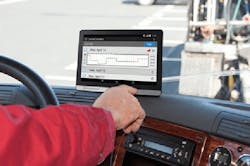FMCSA will grant 90-day ELD waiver for short-term rental trucks
The Federal Motor Carrier Safety Administration (FMCSA) is planning to grant a request from the Truck Renting and Leasing Association (TRALA) for a 90-day waiver from the electronic logging device (ELD) mandate for “short term” rental trucks, defined as being rented out for a period of 30 days or less.
The group said this waiver gives its members until March 18, 2018, to get their rental trucks into compliance with the mandate as well as work with their customers to make the transition to ELDs as easy as possible, noted Jake Jacoby, TRALA’s president and CEO, in a statement.
The group originally requested a five-year exemption for short-term rental trucks and FMCSA initially granted trucks rental for a period of eight days or less relief from the rule.
Many of the issues unique to TRALA rental members stem from the fact that ELD platforms are not interoperable among themselves, the group noted in its commentary.
“For most trucking fleets this is not a problem, but for situations such as break-downs, seasonal overages and peak times, most fleets and small businesses turn to the truck rental industry for relief,” TRALA said. “If a fleet has one ELD system but the rental company has another, it is impossible to combine them without building out new systems, which are both costly and time-consuming.”
Companies such as Penske Truck Leasing also said they are pleased with the FMCSA's decision.
“Penske applauds the decision to grant a 90-day waiver from the ELD requirement on short-term truck rentals,” said Michael Duff, the company's senior vice president of government relations and chief compliance. “While Penske has released and developed an ELD compliant solution of its own for its rental vehicles and is already equipped for customers to bring their own onboard devices, the additional allotted time will be beneficial to the industry and in further helping our full-service truck leasing and commercial truck rental customers transition successfully with the new regulation.”
As technology stands today, for small businesses the interoperability issue could cause a financial hardship and for fleets it could cost significant time for drivers to manually combine their hours-of-service data from two different ELD systems, TRALA added.
“As technology advances and commercial rental fleets devise new methods and systems to adapt to the ELD rules, it is possible that TRALA members will be able to offer their customers a seamless strategy to comply with the rule,” TRALA's Jacoby explained. “But having more time to address these issues was critical to TRALA in its request for a waiver.”
About the Author
Fleet Owner Staff
Our Editorial Team
Kevin Jones, Editorial Director, Commercial Vehicle Group
Cristina Commendatore, Executive Editor
Scott Achelpohl, Managing Editor
Josh Fisher, Senior Editor
Catharine Conway, Digital Editor
Eric Van Egeren, Art Director
